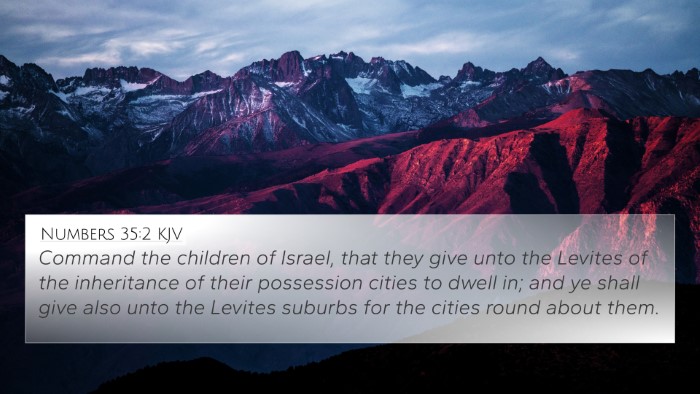Understanding Deuteronomy 18:6
Verse Context: Deuteronomy 18:6 states, "And if a Levite comes from any of your towns throughout Israel where he has been living and comes in all earnestness to the place the Lord will choose," (NIV). This verse highlights the important role of the Levites, priests of the Israelite community, in assuming their responsibilities before God and the people.
Commentary Insights
-
Matthew Henry’s Commentary:
Matthew Henry emphasizes the Levites' unique status as God’s chosen servants, outlining their duties in spiritual and communal matters. He notes that the heartfelt expressions of the Levites signify their devotion to Yahweh, and their willingness to serve in the chosen place indicates a commitment to sacred responsibilities.
-
Albert Barnes’ Notes:
Barnes points out that this verse reflects the mobility and readiness of the Levites to fulfill their duties wherever needed. Their movement signifies adaptability to God’s plans, ensuring that worship and service remain centralized to where God has chosen. The verse encourages believers to embrace service with enthusiasm and obedience.
-
Adam Clarke's Commentary:
Clarke elaborates on the role of Levites as intermediaries between God and the people, emphasizing their importance for national unity and spiritual health. He remarks on how their pilgrimage to the sanctuary embodies a deeper spiritual truth: the pursuit of God and His guidance in worship.
Bible Cross-References
This verse connects to several other Biblical themes and scriptures, helping believers understand its broader implications:
- 1 Chronicles 6:48-49: Discusses the Levites and their service in the house of the Lord.
- Numbers 18:6-7: Outlines the duties and rights of the Levites as a gift for their service in the tabernacle.
- Deuteronomy 10:8: Mentions the Levites' role to carry the ark of the covenant and stand before the Lord to minister.
- Hebrews 7:14: Refers to Jesus' priesthood coming from the tribe of Judah, contrasting with the Levitical priesthood.
- Amos 7:14: A Levite's role is highlighted within a prophetic context, emphasizing their function as intermediaries even amidst judgment.
- Malachi 2:7: Speaks of the priest's lips as a source of knowledge, emphasizing their importance in teaching the law.
- Acts 6:7: Shows the increase of priests who became obedient to the faith, indicating the ongoing role of Levites and priests in the New Testament.
Thematic Connections
The themes prevalent in Deuteronomy 18:6 speak to the concepts of service, dedication, and community worship:
- Service: The spirit of service is a hallmark of the Levites' call, inviting believers to consider their own roles in their communities.
- Dedicating Oneself to God: The Levites’ migration to serve illustrates the importance of prioritizing spiritual obligations.
- Community Worship: The collective aspect of worship reflects the necessity of shared faith experiences.
Cross-Referencing Biblical Texts
Engaging with cross-references is a vital tool for deepening one's understanding of scripture. This involves:
- Using a Bible Concordance: To find verses related to service and priesthood.
- Bible Cross-Reference Guides: Helps identify thematic connections and parallels across both Testaments.
- Cross-Referencing Bible Study Methods: Employing comparative analysis for more profound insights.
Practical Application
Consider how Deuteronomy 18:6 can influence personal and communal faith practices:
- How to Find Cross-References in the Bible: Engage with this text to develop a broader biblical understanding.
- Identifying Connections: Cross-reference between the Levitical duties and the call to ministry in the New Testament.
- Utilizing These Themes: In sermon preparation or personal study, reflect on the role of service within your faith walk.
Concluding Thought
The message of Deuteronomy 18:6 transcends time, providing rich insights into the nature of service and worship. It encourages believers to seek God earnestly, as the Levites did, while fostering a spirit of dedication and communal worship through understanding and cross-referencing scripture.












